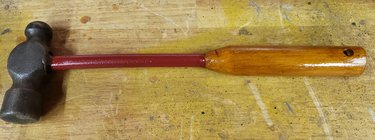We can be change agents
There’s a saying that goes, “When life gives you lemons, make lemonade.”
With COVID-19 and all the changes that has entailed — social distancing, trying hard just to score toilet paper, and now wearing masks any time you go out — we all could use some lemonade. Well, I got a little the other day.
I was using some of my found time from not commuting to work to clean up part of my basement. There in a dusty corner I found an old ball-peen hammer that I don’t recall ever seeing before. It was in really bad shape.
It most likely came with a wood handle originally, but that was long gone. Instead someone crudely welded a steel rod to the head. But that wasn’t the worst of it.
The entire thing was covered in rust so dense and deep I imagined it had been in the maintenance room of the Titanic, soaking in saltwater for the past century. That’s how mangled and cruddy this old hammer looked.
I keep a pail around to toss in scrap metal. When it fills, I take it to the scrapyard. I get a few bucks for the metal and keep it out of the landfill. Hopefully, it gets recycled, which is a good deal.
So I was just about to toss the hammer into the bucket when at the last second I had a thought. It’s a trick I learned a long time ago from fooling around with old motorcycles.
I got out an old coffee can, filled it with water, and mixed in about a half-cup of citric acid. Then I dumped the hammer in there and just waited. For the first couple of days, it looked like nothing was happening.
Then, on the third day, the water started to turn black. Soon after, I pulled out the hammer and like a miracle the worst of the rust was gone. I then cleaned it up, using a wire wheel in a drill and, don’t you know, that sucker looked great.
I wound up adding a handle made from a broken shovel, and I painted the shaft. Now that ball-peen hammer, instead of rotting in a landfill or being recycled, will be used by me and probably others when I’m gone. Now that’s what I call making lemonade from lemons.
You can get citric acid at any health-food store. It’s cheap, environmentally friendly, and gently removes even the worst rust in a safe way. It’s also great to run in your dishwasher every now and then. It makes it really sparkle inside. Gotta love it.
The initials for citric acid are CA. These are also the initials for the words Change Agent. The citric acid really was a change agent for this hammer.
That got me thinking about how you and I can be change agents for someone who needs it. I keep reading about so many people who have no friends and no one to talk to. I even saw how in New York City they were forced to bury many, many “unclaimed” coronavirus victims in common mass graves. How heartbreaking.
Sometimes folks just need someone to talk to. That’s all. Someone who will just listen and not judge. That’s what a change agent is. Maybe it can come from a friend, a relative, or you or I.
If doing something simple like listening can get someone back on track, wouldn’t it be great? Who wouldn’t like that? That ball-peen hammer was close to being tossed out. It got a new life. Maybe, in these so, so tough times, we can help bring someone else back to life.
The City Mission in Schenectady is a huge change agent. That’s why I support the mission, which takes in folks who are really down on their luck and often have nowhere else to turn. The mission gives them four things — shelter; food; a Bible; and, perhaps most important of all, someone to listen.
In many cases, and I’ve seen it over and over, the mission gets people back on their feet to where they become productive and engaged members of society. If that’s not God working directly through people I don’t know what is.
Citric acid is a change agent. The City Mission is a change agent. We can be change agents as well. It starts by just listening.
